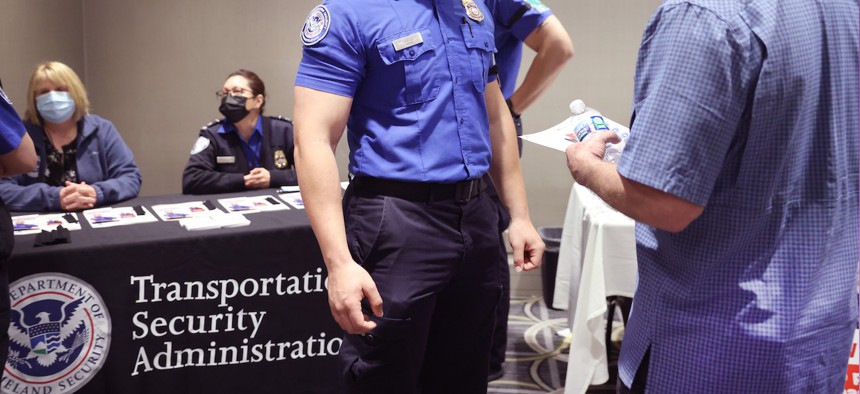
Recruiters with the Transportation Security Administration speak with job seekers during a job fair O’Hare International Airport in Chicago on May 19, 2021. Nearly $400 million was included in the fiscal 2023 omnibus spending package for TSA pay raises. Scott Olson/Getty Images
TSA employees are finally earning similar wages to most other federal workers
Officials on Thursday celebrated the arrival of an up-to-30% pay raise for Transportation Security Administration employees this week, but warned that House spending plans could derail recent progress.
The Transportation Security Administration this week hit a major milestone in its efforts to design a new personnel management system akin the one governing most of the federal workforce, as the agency’s 60,000 employees began receiving pay checks reflecting an up to 30% pay raise.
But agency officials and Democratic lawmakers warned the recent progress could be fleeting unless a spending plan proposed by House Republicans that would rescind the pay increase for portions of the TSA workforce is defeated.
Since its inception following the September 11, 2001 terrorist attacks, TSA employees have been part of a siloed personnel system, where they do not receive regular raises like most other federal workers and lack due process and whistleblower protections. They do have an abridged set of collective bargaining rights, although that was not instituted until the Obama administration.
As a result, TSA employees’ salaries have lagged significantly behind their counterparts elsewhere in the federal government, and the agency has suffered from low morale and high employee attrition for years.
Although more than a decade of congressional efforts to place TSA employees under Title 5, which would grant them access to the General Schedule pay system, due process protections and full collective bargaining rights, have thus far failed to bear fruit, in 2021 the Biden administration announced that it would apply the provisions of Title 5 to the agency’s workforce administratively.
After securing nearly $400 million for TSA pay raises in the fiscal 2023 omnibus spending package, lawmakers, Homeland Security Department officials, labor leaders and TSA employees celebrated the first pay checks at a terminal at Ronald Reagan Washington National Airport. Homeland Security Secretary Alejandro Mayorkas said the raises were a long time coming, noting that when he first became a deputy secretary at the department in 2013, Rep. Bennie Thompson, D-Miss., ranking member of the House Homeland Security Committee, called him to lobby for pay raises and full collective bargaining rights for TSA workers.
“It was unfair, and frankly unconscionable, that more than 63,000 of these outstanding TSA public servants carried out their duties for more than 20 years while being paid less than their government counterparts,” said Homeland Security Secretary Alejandro Mayorkas. “It was antithetical to our values. That is why supporting the DHS workforce and securing fair pay for TSA personnel was one of my highest priorities when I became secretary . . . Fighting on behalf of this workforce and ensuring the long term health of this workforce is one of the greatest honors of my life.”
American Federation of Government Employees National President Everett Kelley, whose union represents TSA employees across the country, described the rollout of bigger pay checks marks a “turning point” for the agency.
“Today’s pay check is more than a monetary incentive,” he said. “It’s a symbol of respect, a symbol of dignity and a signal to all of America that we have worked so hard to achieve.”
TSA Administrator David Pekoske said merely the promise of impending pay increases has already produced dividends for the agency, particularly at a time when the number of air travelers has spiked in the aftermath of the COVID-19 pandemic.
“We would not have been to be as successful as we have been, with record volumes of passenger travel through [airports] throughout the country were it not for this pay increase,” he said. “We have seen a 30% increase in the number of applications for open positions at TSA—that is huge, because this is an incredibly competitive job market. And equally important, and in some ways more important, we have seen a 61% reduction in attrition among our workforce since the beginning of the fiscal year. If we retain talent, we don’t’ have to recruit and retrain and spend the funds to do that, and it increases the experience base across the agency.”
However, officials all warned that the recent progress at TSA could prove short-lived. That’s because House Republicans are advancing a fiscal 2024 homeland security appropriations package that guts a sizeable portion of the pay raise. Although the bill includes a $856 million increase in spending to continue funding the pay increase for Transportation security officers, it fails to fund the corresponding pay increase for air marshalls, K-9 handlers and other TSA employees. The removal of funding for their pay raises amounts to a $469 million cut from President Biden’s fiscal 2024 budget proposal and would impact nearly 20% of the agency’s workforce.
“This must be continued into the 2024 fiscal year,” Pekoske said. “Of the eight TSA emploeyes I introduced this morning, five of those eight people would not see funding for [their portion of this] pay increase in fiscal 2024 if the House appropriations bill passes the full Congress. It is critically important that we do this.”
Thompson said that although there is “mischief afoot” as Republican leaders negotiate with House conservatives as part of the appropriations process, he is hopeful that he can persuade his GOP colleagues to reverse course and pay to continue this week’s pay raises into the next fiscal year, which begins October 1.
“Now that we have the money, we need to make sure it stays there, so over the next few months we’ll be making sure that this is not a one-off kind of thing,” Thompson said. “I’m not aware of any raise that has been taken back from employees in our government, and we’re going to make sure that doesn’t happen in this situation.”







